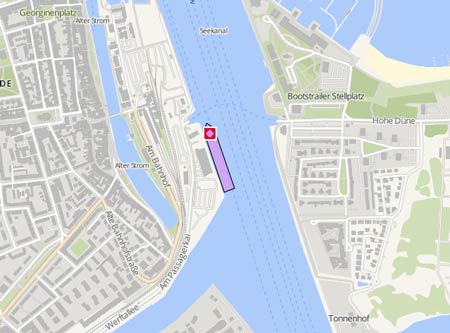BRATSK
Kurs/Position
Die letzten Häfen
Die letzten Wegpunkte
Die neuesten Nachrichten
Russian shadow tanker on sanctions list
The UK government imposed sanctions on 30 vessels, among them the 'Bratsk', that are a part of the Russian Shadow Fleet for performing illicit oil transport operations on Nov 25. In addition, two Russian insurance companies have also been targeted for their role as facilitators. The aim of the sanctions is to hinder Russia from continuing its offensive in Ukraine by hamstringing Russian oil revenues. The tankers have transported more than $4.3 billion of oil and its derivatives in the last year alone. With this sanctions package, the total number of vessels in the Russian shadow fleet sanctioned by the UK has risen to 73, the highest of any nation in the world. Along with the sanctions, the UK government also exhorted other countries to follow its call to action and act against the shadow fleet. So far, 46 countries have joined this initiative. The vessels that operate in the shadow fleet engage in deceptive practices and are poorly maintained, leading to a hazard on the open seas and increasing the danger for all other vessels. Therefore, cracking down on the vessels and the companies that insure them would also clear shipping lanes of unsafe traffic. The Russian insurance companies Alfastrakhovanie PLC and VSK have been sanctioned. This will prohibit any cooperation with these insurers and effectively cut them off from the international markets. The tankers that have been placed in sanctions will be banned from entering UK ports. The UK authorities have reserved the right to direct the movements of these vessels and detain them if needed. These vessels will not be registered on the UK Ship Register, and existing registrations of these vessels will be terminated. In addition to this, these vessels will not be able to benefit from price cap exemptions even if they were involved in transactions that qualify for the Oil Price Cap Exception.
14 Sovcomflot tankers pinned by USA
The USA have pinned 14 of Sovcomflot's tankers, the 'Anatoly Kolodkin' NS Antarctic', 'NS Lion', 'Ns Consul', 'Ns Burgas', Ns Captain' 'NS Columbus', 'Sakhalin Island', 'Nevskiy Prospect', 'Georgy Maslov', 'Liteyny Prospect', 'Krymsk' 'Ns Creation' and 'Ns Bravo', giving the Russian shipping company 45 days to unload oil and other cargo. The company is being prosecuted for violating the crude price cap in force since December 2022. This battalion of clandestine ships, owned by companies with opaque ownership to conceal illicit operations, has been in the crosshairs of the Western coalition for many months with widely documented practices such as STS oil transfer operations and deactivation of AIS, with the fleet constantly expanding. The Office of Foreign Asset Control of the Treasury (OFAC) has designated the 14 tankers in which Sovcomflot has an interest, and in particular 12 of the 75 vessels operated by the Oil Tankers SCF Management FZCO, a company which had to inherit part of of the SCF fleet when the latter was forced to sell or disperse to companies abroad following international sanctions. The first inclusion of SCF on the international sanctions list (United Kingdom, European Union, Australia, Canada, New Zealand, etc.) dates back to 2022 and concerned financial transactions involving long-term debt or new shares. The company has 45 days to unload oil and other cargo, but OFAC has not banned transactions for its other tankers and has even made it clear to oil traders that they can continue to use the large majority of the Russian carrier's fleet without repercussions, which claims 147 ships. Capping the price of oil, which consists of applying a discount per barrel of crude compared to the market price but without harming the stability of international markets, aims to limit the resources that Russia earns from the sale of hydrocarbons. Russia sold its oil in January at a discount of $19 per barrel compared to Brent (international benchmark) compared to $12 to $13 per barrel in October. With a barrel at this price, Russia therefore received 75% of the oil revenue it should have received, or 25% less. At the same time, Russian military spending has increased by 60%, leading many observers to say that the system is ineffective, due to a lack of monitoring and control means. 196 tankers, identified as belonging to the clandestine fleet, had left Russian ports in December 2023. Five new shipping companies based in the United Arab Emirates have started to transport Russian crude since November 2023. The US Treasury has sanctioned 27 oil companies for violating the price cap since October, when the cap was implemented.
New charter fixed
$23,000, for 1 year trading, to BP
News schreiben

